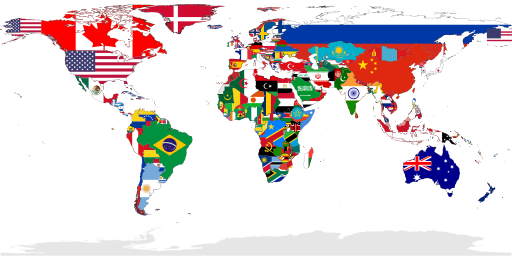Difference Between Autonomy and Sovereignty: Defining the right to self-government

A map showing the flags of the world
Autonomy vs Sovereignty: Defining the right to self-government
When cracking open a thesaurus to find synonyms for “freedom,” one will undoubtedly come across the words “autonomy” and “sovereignty.” (If you feel the need, go ahead and check your thesaurus now. I’ll wait.) On a surface level, these two terms seems comparable. They both celebrate free will and stand as belligerents to authoritarian power. However, the two words are not perfect equivalents.
Autonomy indicates the existence of a central authority. Autonomy is granted to a smaller entity by some higher authority. For example, Puerto Rico is considered be an autonomous U.S. territory, meaning that the state is free to pursue its own version of self-government, but it does so under the authority of the federal government of the United States of America. Although autonomy does entail some leeway in the realm of self-liberty, the freedom is the result of a trickle-down phenomenon where power is derived in a larger, more authoritative entity.
Sovereignty has an inverse relationship with power in comparison to autonomy. Instead of descending from a central authority, sovereignty is the central authority. Sovereignty etches out a country’s control of its geopolitical space. The term also carries a smidge of imperialism with it. In the words of first Turkish President Mustafa Kemal Ataturk, “Sovereignty is not given, it is taken.” Typically, a powerful political entity possesses sovereignty over a particular smaller political entity or territory. Returning to the Puerto Rico example, the US government possesses sovereignty over this unincorporated territory.
In the grand scheme of the international relations, a sovereign state is the ultimate political unit. The United Nations defines a sovereign nation as one who is in complete control of affairs – without any external meddling – within its borders. The definition is vague and usually open to discussion amongst existing members. However, the common thread amongst those countries that are distinguished as sovereign is a consistent self-sufficiency that doesn’t require the financial backing of a larger political entity. (Granted, this too is debatable for countries like North Korea or Cuba who have long been dependent upon backing from larger communist/socialist states like China and Venezuela.)
The use of the term autonomy usually is applied to regions or territories with a population of people who wish to assert their independence from the larger, central authority. Quebec is a great example of a political entity seeking to assert itself as an autonomous province. The French speaking Quebecoise represents a political movement attempting to seek more autonomy from the Canadian federal government, while still being a part of the federation of provinces.
Sometimes autonomous zones are established within the borders of a sovereign nation. Typically, these zones contain an ethnic minority that considers itself independent from the greater nation-state. China has established such zones for territories like Tibet and Inner Mongolia. Although there are independence movements within these zones to establish complete independence from the Chinese Communist Party, these autonomous territories are provided with their own local government and legislative rights. Regardless of the autonomy granted, however, the People’s Republic of China still possesses the sovereignty over the zones. Similar autonomous zones can be found in Russia, New Zealand, and India.
On the sliding scale of pure liberty, autonomy resides below sovereignty. The differences are purely technical and rhetorical in nature. The question of where autonomy stops and sovereignty begins is best answered by whomever the “final arbiter” is – namely, who has the authority to make the ultimate decision or overrule the decisions of others. If that power is not vested in you, you are probably not considered to be sovereign.
By Jay Stooksberry
- Difference Between an Atomic Bomb and a Hydrogen Bomb - May 23, 2015
- Difference Between Multiplexer and Decoder - May 21, 2015
- Difference Between Chicken pox and Small pox - June 3, 2014

in 3rd sentence: “these two terms seem”, not ‘seems’